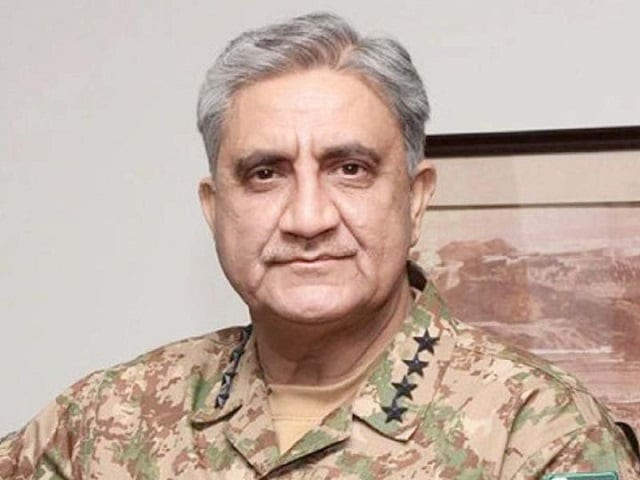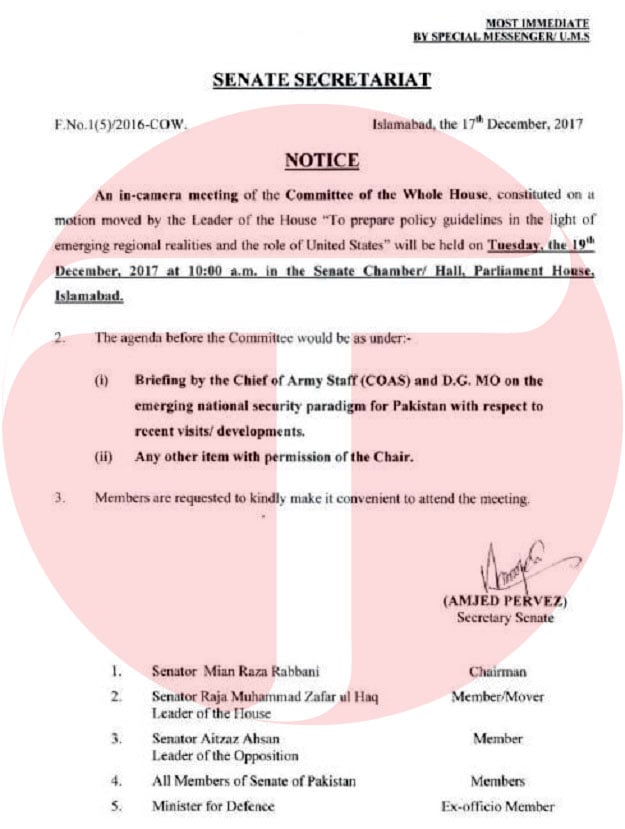In a first, army chief to brief senators on security situation
DGMO will also brief the in-camera meeting of the Senate committee, scheduled for 10am on Tuesday

Army chief Gen Qamar Javed Bajwa. PHOTO: ISPR/FILE
The in-camera briefing to the Committee of the Whole House—constituted to prepare the policy guidelines in light of the emerging regional realities and the role of the United States—would be held on Tuesday, said an official handout issued by the Senate Secretariat on Sunday.
The agenda of the unprecedented meeting includes a briefing by the army chief and the director general Military Operations (DGMO) on the ‘emerging national security paradigm for Pakistan with respect to recent visits and developments.’
Any other item could also be taken up with the permission of Senate Chairman Raza Rabbani, the statement added.
Pakistan People’s Party Senator Farhatullah Babar welcomed the move by the GHQ to brief the Senate on crucial regional security issues. Babar has been one of the strongest proponents of Parliamentary supremacy and has routinely refused to visit GHQ for security briefings, arguing that instead of lawmakers going to Rawalpindi, the military leadership should appear before Parliament.
Hold off on pledge to Saudis, Senate tells govt
The veteran PPP leader told The Express Tribune that ‘a lot of questions’ needed to be answered on a number of issues, including Pakistan’s role in the Saudi-led Islamic Counter Terrorism Military Coalition.
Opposition lawmakers have been expressing serious reservations over Pakistan’s participation in the coalition and are pushing the government to table the Terms of Reference (ToRs) of the coalition before parliament.
It is expected that the Army Chief would answer all those questions and attempt to address lawmakers’ grievances.
The ToRs of the much-talked-about Saudi coalition were unveiled in Riyadh last month during the inaugural meeting of the group’s defence ministers.
The broader contours envisage joint counterterrorism military operations, but at the same time allow member countries to decide their respective role in accordance with their capabilities and desire.
This provision may allow Pakistan to restrict its participation only to the extent of intelligence sharing, training, and other indirect roles.
Saudi coalition ToRs allow Pakistan to decide its role
Pakistan has already conveyed its ‘red lines’ to Saudi Arabia on the issue. One of the red lines includes no boots on the foreign soil or participation in any activity that targets another Muslim country.
Pakistan’s efforts to maintain a delicate balance is aimed at avoiding getting embroiled in the intensifying Iran-Saudi rivalry.
Last month, the army chief visited Tehran for what senior Iranian diplomats here described as an ‘extremely successful’ visit. The two countries during Gen Qamar’s visit reportedly reached a broader understanding on key issues including the Saudi alliance.
The army chief will also speak to lawmakers on Tuesday about his visit to Iran and its outcomes, said a source familiar with the agenda.
Other issues that would dominate the debate include Pakistan’s ties with the US in the wake of President Donald Trump’s strategy for Afghanistan and South Asia.
Despite several visits by high-ranking US officials, the two countries have yet to develop consensus on how to go about in the fight against terrorism and deal with the current situation of Afghanistan.
Washington’s main concern is that Pakistan is still not doing enough against certain militant outfits including the Afghan Taliban and the Haqqani network. Islamabad strongly rejects the allegations and insists that it has done more than any other country in the fight against terrorism.
Some opposition senators, who spoke on condition of anonymity, said they would also bring up other security-related issues including the role of the military establishment in brokering a deal to end the Faizabad sit-in last month.



















COMMENTS
Comments are moderated and generally will be posted if they are on-topic and not abusive.
For more information, please see our Comments FAQ